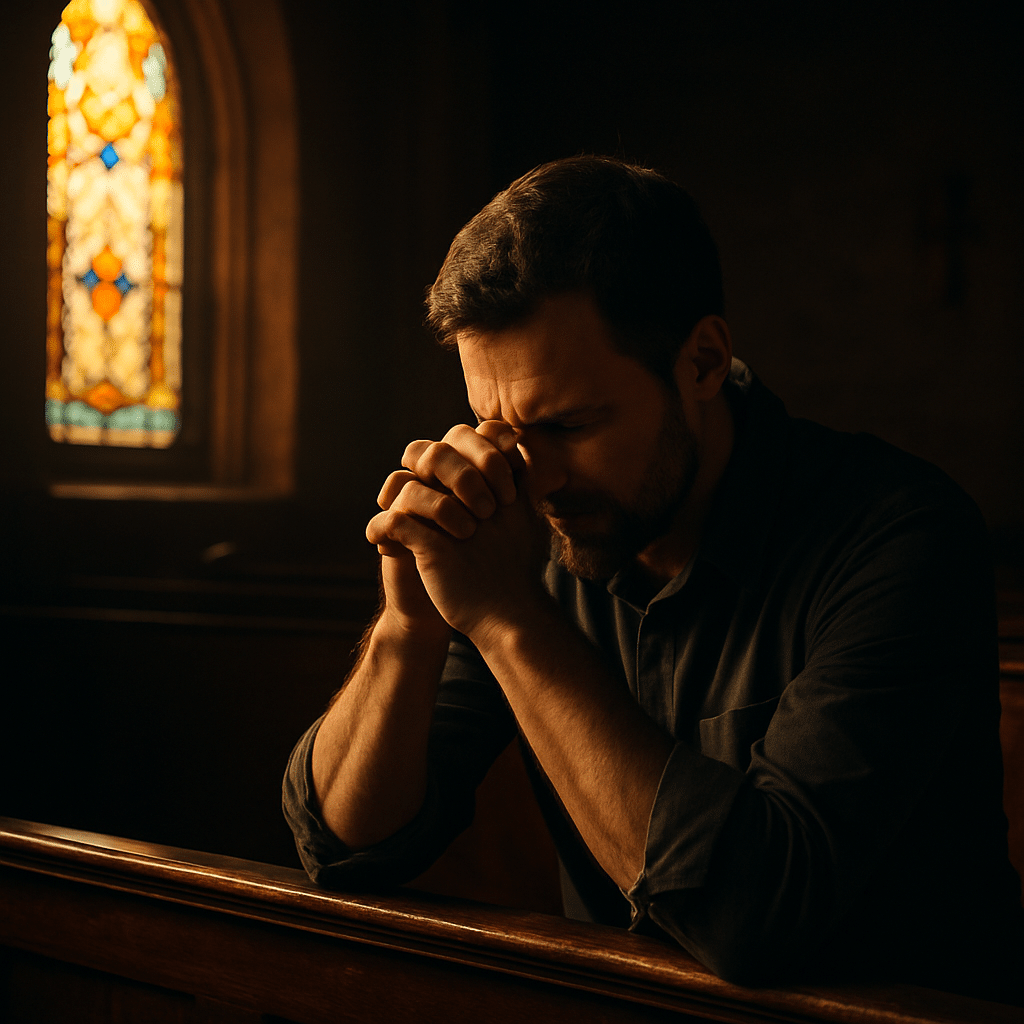God and Anxiety – Biblical & Scientific Steps to Real Peace
Estimated reading time: 9 minutes
God and Anxiety: Why Your Fear Does Not Disqualify You
The subject of god and anxiety touches nearly every life, yet many believers feel guilty when worry intrudes. Accordingly, this article will show that God understands your anxious thoughts and provides practical help. In the United States alone almost one in five adults lives with an anxiety disorder, and worldwide the figure exceeds 300 million. Nevertheless, God invites every anxious heart to draw near: “Cast all your anxiety on Him, because He cares for you” (1 Peter 5:7).
After all, feeling alarmed is part of our God‑given fight‑or‑flight system; the problem arises when that alarm keeps ringing long after danger passes. Because of that truth, we will explore god and anxiety from two directions at once—faith and science—so you grasp both the spiritual promise and the neurological process. Furthermore, you will read Bible passages that anchor the soul, review peer‑reviewed studies that confirm the power of prayer, and learn why seeking medical care does not diminish trust in God.
By the end you will hold a toolbox of biblical practices, therapeutic skills, lifestyle adjustments, and recommended resources that cooperate with the Holy Spirit to restore peace. Consequently, you can move from merely surviving anxious days to thriving in a deeper relationship with Christ, confident that “the peace of God, which transcends all understanding, will guard your heart and mind” (Phil 4:7).

Understanding God and Anxiety in Body and Soul
God and anxiety begin in the same place—your Creator’s protective design. Your amygdala reads danger signals and, almost instantly, orders the release of adrenaline and cortisol so you can flee or fight. Consequently, your pulse quickens and muscles tense, which is useful if a dog lunges at you.
Unfortunately, modern life triggers this alarm endlessly—deadlines, social media, financial uncertainty—so the body ends up living in a permanent state of emergency. Chronic over‑activation explains why you might feel shaky in the grocery line with no real threat present. Scientists have mapped this process with functional MRI: people with anxiety show amplified activity in the amygdala, insula, and anterior cingulate cortex; twin studies estimate that forty percent of generalized anxiety risk is inherited (Therapy Group research).
Behind the biology, however, sits a spiritual question of control. When we silently assume the universe rests on our shoulders, vigilance never stops. Jesus addressed that assumption on the hillside in Galilee: “Look at the birds… your heavenly Father feeds them” (Matt 6:26). In effect He said, Someone larger is already carrying what concerns you. The intersection of neuroscience and theology therefore offers hope.
Medication or therapy can quiet hyperactive circuits, granting the clarity needed to practice faith disciplines, while prayer and Scripture re‑train the soul to rest in God’s sufficiency. Taken together, biological care and spiritual truth form a single answer, not rival prescriptions. This holistic view frees you to seek professional help without shame and to pursue devotional habits without ignoring physiology.
Biblical Foundations: Promises That Bridge God and Anxiety
Because the Bible speaks to anxious souls more than three hundred times, it offers an unmatched reservoir of comfort for those wrestling with god and anxiety. Isaiah 41:10 reassures, “Fear not, for I am with you,” linking the command directly to God’s presence. Likewise, Paul prescribes prayer, petition, and thanksgiving as the path toward “the peace of God” that guards the heart (Phil 4:6–7).
Transitioning from fear to faith always involves truth—truth about who God is and truth about His provision in Christ. Accordingly, memorizing verses, journaling answered prayers, and sharing testimonies in small‑group settings all reinforce that truth. Furthermore, an International Journal of Depression & Anxiety review of thirty‑two studies confirms that religious involvement consistently predicts lower anxiety.
As Corrie ten Boom observed, “Worry does not empty tomorrow of its sorrow, it empties today of its strength.” Therefore, weaving Scripture into daily rhythms isn’t a cliché; it is strategic spiritual warfare. When anxious thoughts attack, counter with, “The Lord is my light and my salvation; whom shall I fear?” (Ps 27:1). Over time the renewed mind defaults to trust, and peace becomes the atmosphere in which joy can flourish.
Practical Solutions: Walking the PEACE Path
Because god and anxiety intersect in body, soul, and mind, they deserve a multi‑layered response. Here is a framework remembered by the acronym PEACE: Pour out your heart through prayer, Engage professional help, Adopt healthy habits, Connect with supportive community, and Equip yourself with helpful resources.
Studies from the National Institute of Mental Health show that combining therapy, lifestyle change, and faith practices produces remission rates twice as high as using any single strategy alone. Moreover, Scripture portrays the same synergy: Nehemiah prayed and posted guards; Paul trusted God and asked the church for assistance; Timothy believed the gospel and took medicinal wine.
Likewise, you can rely on the Spirit while scheduling a counseling session, memorizing a verse, or lacing your shoes for a brisk walk. Set realistic expectations—healing often unfolds gradually, yet every small victory rewires the brain toward calm. Therefore, keep short accounts, celebrate each step, and refuse perfectionism. The next subsections unpack tools you can start this week.

Prayer & Surrender
Prayer shifts the burden. Start each morning by naming your chief concern and surrendering it aloud: “Father, my presentation frightens me, yet I hand it to You.” Immediately add gratitude—thanking God trains the brain to notice His faithfulness and satisfies Philippians 4:6. Additionally, short breath prayers during the day keep the nervous system calm.
Inhale to four while thinking “Be still,” hold to four, then exhale to six whispering “and know that I am God” (Ps 46:10). Within two minutes your heart rate drops, parasympathetic tone rises, and muscles unclench. Complement private petitions with corporate prayer; a clinical study showed guided intercessory sessions reduced anxiety even twelve months later. To coach the habit, install the free Lectio365 app or explore our in‑depth biblical guide to anxiety. Additionally, pair every request with a matching promise.
If you fear financial shortage, pray Philippians 4:19. If panic wakes you at night, whisper Psalm 4:8 until you fall asleep. Over time the brain links threat cues with Bible assurance, shortening each anxious spike. Finally, share answered prayers with friends; testimony cements confidence and magnifies God’s glory.
Therapy, Medicine & Stewardship
Cognitive‑behavioral therapy (CBT) teaches you to catch distorted thoughts, check them, and change them—exactly what 2 Corinthians 10:5 commands. The Anxiety & Depression Association of America notes that CBT paired with SSRIs helps roughly 70 percent of patients (ADAA treatment page).
Licensed Christian therapists are listed in the American Association of Christian Counselors directory. Before your first appointment, jot down three situations that trigger anxiety; the list guides exposure work. During sessions, integrate Scripture—many clinicians encourage breath prayer during hierarchy exercises. If intrusive physical symptoms persist, ask about options such as sertraline or buspirone; a Christianity Today article testifies how medicine gave one mother’s mind “room to receive God’s peace.”
Remember Proverbs 21:31: preparing the horse for battle and trusting God for victory are compatible. Keep loved ones informed so your progress stays covered in prayer, and explore our resource on panic‑attack relief.
Lifestyle, Community & Service
Sleep, exercise, nutrition, and fellowship form a practical shield against god and anxiety. Aim for seven to eight hours of rest; inadequate sleep raises cortisol by thirty percent next day. Exercise three times per week—brisk walking can rival low‑dose medication for mild anxiety according to a Frontiers in Psychiatry study.
Swap excess caffeine for water, and eat foods rich in omega‑3s and magnesium. Engage community: Galatians 6:2 urges believers to bear one another’s burdens. Join a small group, volunteer, or simply text a friend when panic flares. Serving others shifts focus outward and reinforces Ephesians 2:10. To learn more, read our article tailored to social anxiety.
When possible, walk in nature; a fifteen‑minute green break lowers salivary cortisol by sixteen percent. Finally, practice Sabbath rest. Unplugging to delight in God and loved ones reminds your nervous system that life is more than productivity.
Helpful Resources & Products
The following tools have helped many readers navigate god and anxiety:
- Book: Anxious for Nothing by Max Lucado offers Scripture‑saturated encouragement and practical exercises.
- Devotional App: The free YouVersion “Peace in Anxiety” reading plan guides six days of reflection on God’s promises.
- Meditation Aid: The Abide Christian meditation app features bedtime stories scientifically shown to reduce heart‑rate variability.
- Supplement: Pharmaceutical‑grade omega‑3 fish oil (consult your doctor first) supports brain health and may lower inflammation linked to anxiety.
- Wearable: A basic fitness tracker prompting you to breathe and move fights sedentary stress.
Each resource above is vetted by mental‑health professionals and reviewed for usability. Begin with the free options, test them for thirty days, and keep only those that genuinely support calmer thought patterns. Discuss supplements with your physician; even natural products can interact with prescriptions.
Couples might stream an Abide bedtime story together to align breathing rhythms, while parents can explore our Bible‑verse compilation with anxious teens. Remember, gadgets cannot replace the gospel, but they can remind you to practice it.

Conclusion: Hope That Outshines God and Anxiety
Anxiety may shout today, yet God’s voice is louder and kinder. Because Christ conquered death, He can certainly tame racing thoughts. Therefore, step forward—pray, seek counseling, move your body, take medication if needed, and rehearse Scripture. Little by little you will notice worry losing its grip and joy returning. Should fear flare again, remember Jesus whispers, “Take courage! It is I. Don’t be afraid” (Matt 14:27).
Additionally, bookmark this guide on god and anxiety and revisit it whenever doubts resurface. Forward it to a friend so you travel the journey together. If progress stalls, seek fresh counsel; perspective often unlocks the next step. Above all, refuse shame. Jesus never berated the fearful; instead He reached out His hand. Imagine the day you pause where panic once ruled, breathe, smile, and thank God.
That future is possible because “the same power that raised Christ from the dead lives in you” (Rom 8:11). Grip that promise, practice the steps, and walk forward expecting divine help at every turn.







